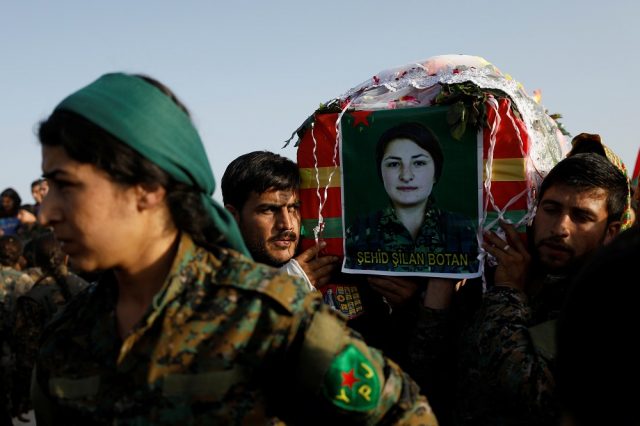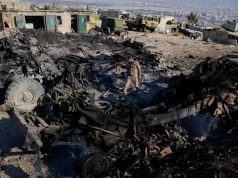
QAMISHLI, Syria/ANKARA — The head of the Syrian Kurdish YPG militia said on Wednesday that Turkish military deployments near Kurdish-held areas of northwestern Syria amounted to a “declaration of war” which could trigger clashes within days.
Turkey’s Deputy Prime Minister Numan Kurtulmus retorted that his country was not declaring war but that its forces would respond to any hostile move by the YPG, which he described as a small-scale army formed by the United States.
The mounting tensions between two U.S. allies in northwestern Syria risk opening yet another front in the multi-sided conflict, in which outside powers are playing ever greater roles.
They could also distract the YPG from the U.S.-backed campaign it is spearheading to capture Islamic State’s stronghold of Raqqa, some 200 kilometers (125 miles) away.
Asked by Reuters whether he expected a conflict with Turkey in northern Syria, where the two sides have exchanged artillery fire in recent days, YPG Commander Sipan Hemo accused Turkey of preparing for a major military campaign in the Aleppo and Afrin area.
“These (Turkish) preparations have reached level of a declaration of war and could lead to the outbreak of actual clashes in the coming days,” he said in emailed comments. “We will not stand idly by against this potential aggression.”
Turkey’s policy in northern Syria has been focused on containing the growing sway of Kurdish groups that have established autonomous regions since Syria’s war began in 2011.
Ankara says the YPG represents a security threat, seeing it as an extension of the Kurdistan Workers Party (PKK), which has been fighting an insurgency against the Turkish state for decades.
“This is not a declaration of war. We are making preparations against potential threats,” Kurtulmus told Reuters in an interview. “Their (YPG) primary goal is a threat to Turkey, and if Turkey sees a YPG movement in northern Syria that is a threat to it, it will retaliate in kind.”
President Tayyip Erdogan said Turkey was ready to carry out ground operations against Kurdish forces in northern Syria along with the rebel forces it backs there if necessary.
“If there is a threat against us, our troops will conduct any operations with the Free Syrian Army on the ground,” he told France 24 television in an interview shown later on Wednesday.
Turkish forces deployed in northern Syria last year in support of FSA groups in an operation that forced Islamic State away from the border and also drove a wedge between YPG-held areas.
In recent weeks, Turkey has sent reinforcements into the area north of Aleppo, according to Turkey-backed rebel groups who have established control over a section of the Turkish-Syrian frontier with Ankara’s support.
Hemo was last week cited as saying the YPG had a plan to capture that area between the towns of Azaz and Jarablus. Asked about that remark, he described the Turkish intervention as “occupation” of Syrian land, and said the YPG had never “threatened Turkey or its security”.
Long-term plans
Turkey, a NATO member, has been incensed by the U.S. decision to ally with the YPG. Washington took the decision to arm the group before the final assault on Raqqa began in June.
The YPG is fighting under the banner of the Syrian Democratic Forces, which includes Arab fighters.
In separate comments to the Saudi-owned Asharq al-Awsat newspaper published on Wednesday, Hemo said the United States had established seven military bases in areas of northern Syria controlled by the YPG or SDF, including a major airbase near Kobani, a town at the border with Turkey.
Citing operational security, the coalition said it did not confirm or deny information about “specific capabilities, force numbers, locations or movement of forces in Iraq and Syria.”
Hemo indicated the YPG would keep fighting Islamic State even after its defeat in Raqqa, saying it was committed with “the international coalition to cleansing Syria of terrorism and establishing a political system capable of achieving real democratic transformation.”
Turkish defense ministry sources said last month the United States had pledged that weapons provided to the YPG would be taken back once Islamic State was defeated. Turkey says that is not credible.
“There has never been an incident where a group in the Middle East has been armed, and they returned the weapons,” Kurtulmus said. The United States “have formed more than a terrorist organization there, they formed a small-scale army.”
He also warned the YPG not to try to drive out Arab or Turkmen residents from the town of Tel Rifaat, which is close to Afrin and controlled by YPG and Arab allies in the U.S.-backed Syrian Democratic Forces.
U.S. Defense Secretary Jim Mattis has left open the possibility of longer-term assistance to the YPG, saying the U.S. may need to supply them with weapons and equipment even after the capture of Raqqa.
Hemo said U.S. officials had denied any intention to take away the YPG’s weapons and that the YPG would be needing more support due to its longer-term plans to tackle the remnants of Islamic State.









